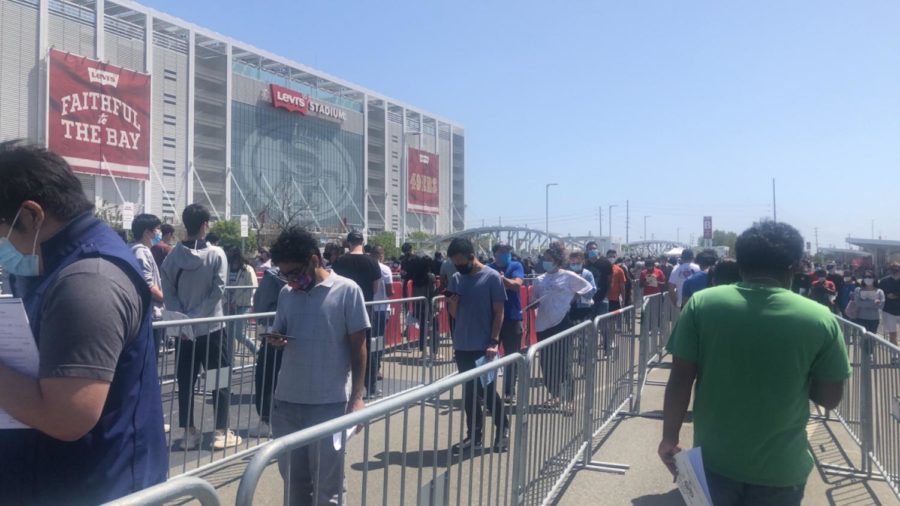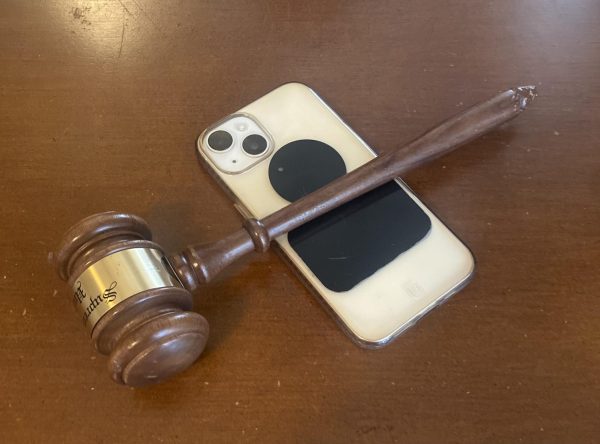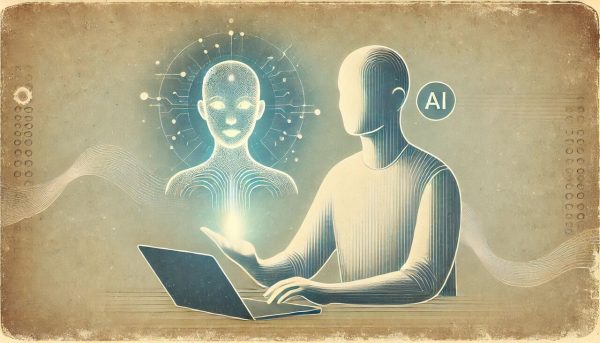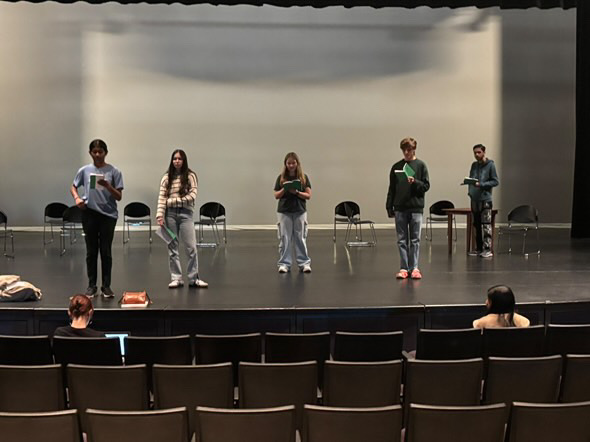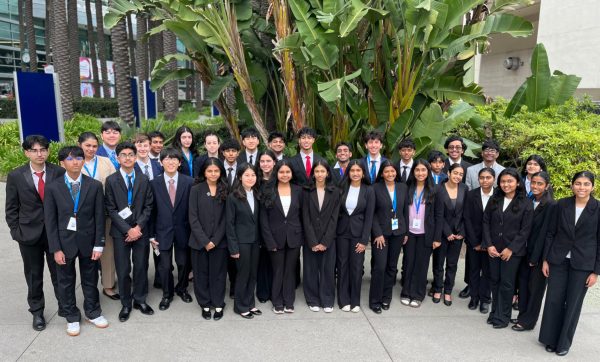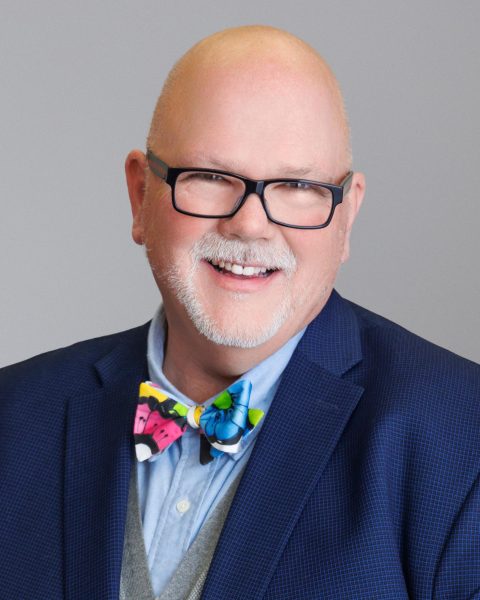There Is No Fast Pass For The Vaccine!
Levi’s Stadium has given over 100,000 vaccinations, and the stadium was filled with people lining up to receive their first and second doses.
Beginning April 15, the state of California permits anyone older than 16 years of age to sign up for a COVID vaccine. However, health officials in Santa Clara County have a major concern: there are not enough vaccines to go around. According to The Mercury News, Santa Clara County health officials fear the state’s “continuing inadequate” coronavirus vaccine supply will not increase dramatically for “a few weeks,” requiring them to cancel thousands of appointments.
The expansion of vaccine eligibility is not the only reason why the vaccine supply is so low. Line-cutting has become prominent in California as vaccination rates increase by the thousands every day. According to MSN News, a top Sacramento healthcare provider states that California risks affecting “the truly sick” by allowing patients aged sixteen to sixty-four to get vaccines without evidence that they have a qualified underlying health condition that puts them at high risk for a serious COVID-19 case. From top VIPS of biotech company, Moderna, to relatives to frontline workers, anyone can get the vaccine with the right connections, especially here in California.
There were several discussions and debates months before the US Food and Drug Administration even approved the first COVID-19 vaccine on who should be put first in line to receive it. The Advisory Committee on Immunization Practices (ACIP) of the US Centers for Disease Control and Prevention — the body that actually produces vaccine use recommendations — eventually released its guidance. In Phase 1a, health care professionals and residents of long-term care facilities are at the top of the priority list. After which came Phase 1b, which included people aged seventy-five and over, as well as the frontline key staff who are not in the health-care industry. Following that, people aged sixty-five to seventy-four, and people aged sixteen to sixty-four with high-risk medical conditions, and other critical staff were included in Phase 1c. However, things began to get a little complicated shortly after the FDA approved the first vaccines. Several states, including California, began to develop their own rules, resulting in a mishmash of qualifications.
Felicia Shivakumar, a preschool teacher at Neighborhood Christian Center in Santa Clara gave her story of the vaccine experience she went through. As a frontline worker who was due to get her vaccine under Phase 1b, one would think the county would provide them priority to get their vaccine as they have been working in-person throughout the pandemic. But Shivakumar states that “the county did not support us in getting the vaccine. There was too much information needed to book an appointment, and by the time we collected all the info that we needed, the appointment slot was taken by someone else.” Usually, at vaccine centers, a patient would need to provide proof such as recent pay stubs or current ID that they qualify to get the vaccine under the phase restrictions that CDC has put out. But Shivakumar states that does not happen. She states that people were able to receive their vaccines by giving pay stubs from before the pandemic and in some cases no evidence at all. She also touched on the topic of how the process of receiving the vaccine puts most frontline workers at a disadvantage. She states that “those with private insurance at hospitals such as Kaiser Permanente and Sutter Health get a faster pass to receive the vaccine as the booking process is different. But for frontline workers who receive the vaccine through the county, the process is longer and more tedious.” Private hospitals and vaccine centers are some of the few places people can get vaccinated. According to California guidelines, if a person visits a pharmacy or a public health facility without a medical history on paper, those locations take the person’s word that they might have an underlying condition for which they qualify to get the vaccine. The state recommends but does not mandate, that such sites request written verification, stating the need to maintain confidentiality. Dr. David Lubarsky, head of UC Davis Health in Sacramento, scrutinized this approach claiming that people who do not qualify can easily cut in front of people who have a more emergent need to get the vaccine. “We know people are anxious to get vaccinated, but opening the floodgates without a gate tender will cause more harm than good,” Lubarsky wrote. “With so many people now … deciding for themselves that they are eligible, this will push truly sick and poor patients farther back in line.” UC Davis is one of the main vaccination centers in the city of Sacramento and doses are still lacking in the city. Although federal officials have set plans to roll out more shipments of vaccines, thousands of people who qualify in California have been told to wait. In some cases, delaying second shots, ignoring the fact that federal drug protocols require the Pfizer and Moderna vaccines to be given three to four weeks after the first dose.
The vaccine restrictions have also gotten the rich and privileged of society buying their way through the lines. Patients in Southern California, which is at the center of the state’s COVID-19 crisis, are promising to pay top dollar to bypass the line and be among the first to receive the vaccine. Doctors at a number of Southern California VIP medical practices say they have received calls from affluent patients asking if they should get first dibs on the highly restricted supply of vaccine doses in return for a financial donation to a hospital or charity. And this is not happening only in the U.S. According to CNN, Rodney Baker, the former president and CEO of the Great Canadian Gaming Corporation, and his wife, Ekaterina Baker, are facing charges for allegedly chartering a plane to a small town in western Canada, and posing as local staff to obtain the vaccine.
Getting as many people vaccinated as fast as possible is extremely vital now, especially before more variants break out. There have been twenty-three confirmed cases of the three different variants here in Santa Clara county. As has become clear in the past year, California has been one of the states to get hit the hardest by the virus and following the vaccine plans that federal officials have set is more vital now than ever.

